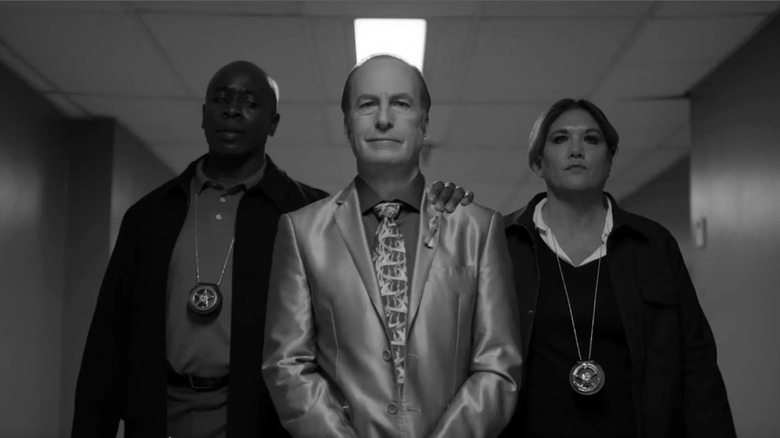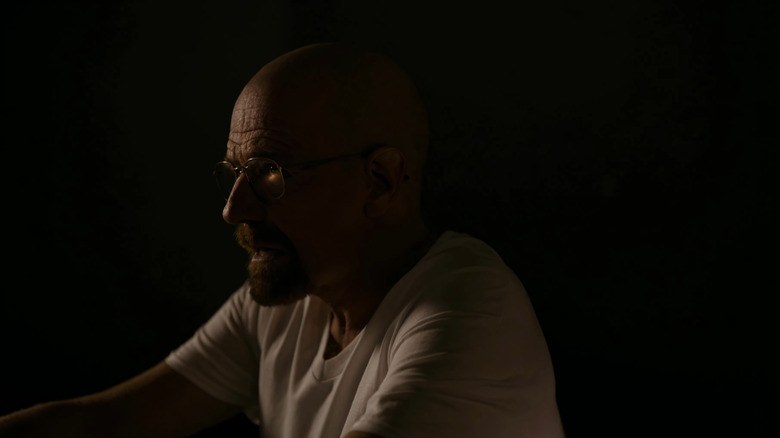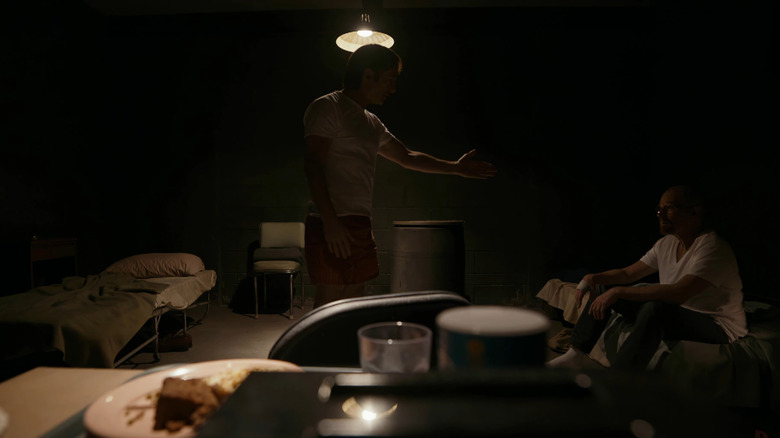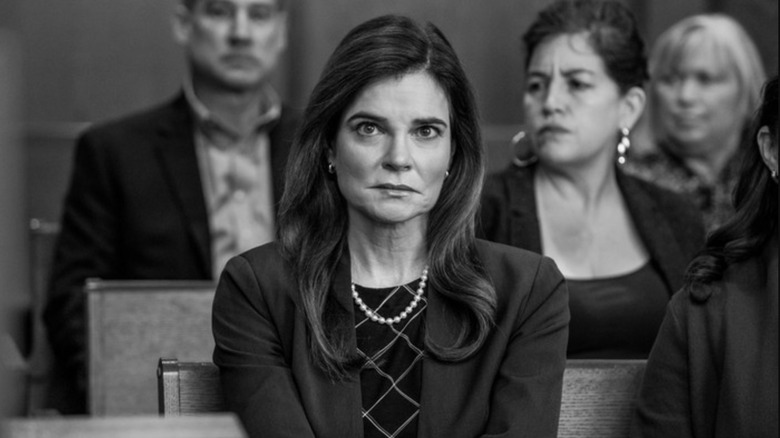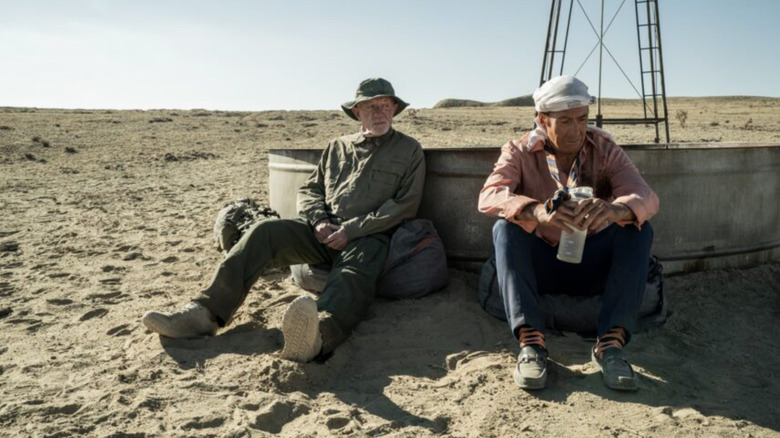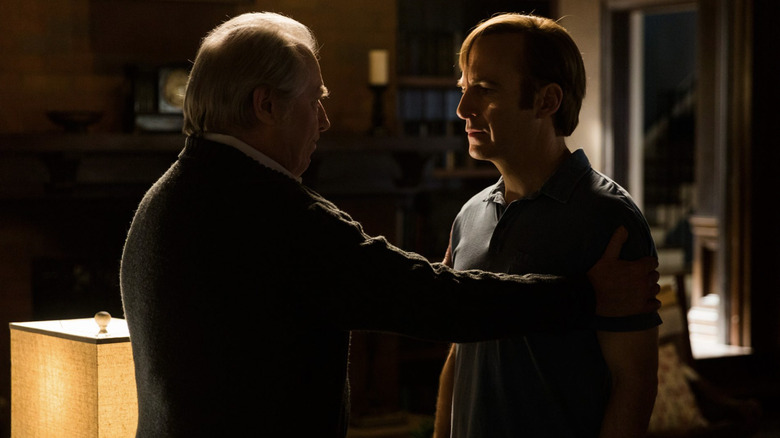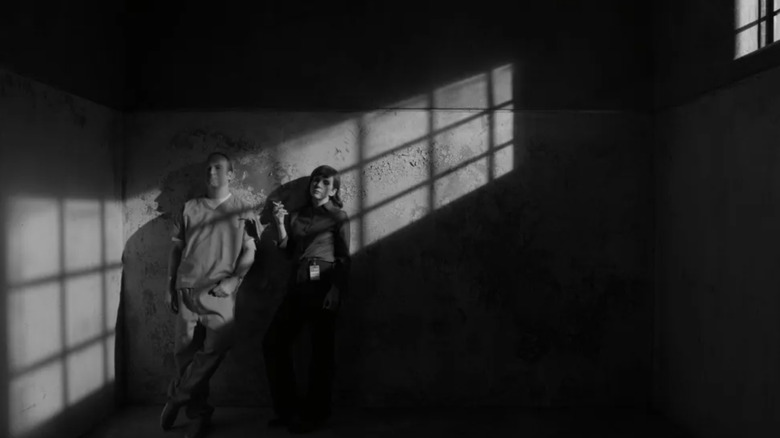The Better Call Saul Finale Didn't Just End The Series – It Closed The Book On Breaking Bad
"Better Call Saul" ended with the series finale, "Saul Gone." The prequel/sequel series told the story of James McGill and his descent into deceit and criminality. Jimmy's transformation into Saul Goodman was filled with heartbreak, familial trauma, and many fantastic montages. Interestingly enough, the series finale doesn't just feel like the ending to "Better Call Saul" — it feels like a definitive conclusion to the "Breaking Bad" universe that started in 2008.
"Saul Gone" plays like an episode that knows it will be the last time you see the actors portray these characters on screen, and it doesn't waste any opportunity to remind you of who they are. Throughout 11 seasons of television and one feature-length film, Vince Gilligan, Peter Gould, and so many other talented writers and directors created a rich, character-driven world. One that feels like it's come to its natural end with the series finale of "Better Call Saul." Any loose threads left in the wake of either show were addressed in unique ways, giving a definitive conclusion to the large cohesive story the three projects told.
From anecdotes involving fan-favorite characters of the past to longstanding unanswered questions, "Saul Gone" gives us one last definitive look at the "Breaking Bad" universe before putting it to an end.
One last reminder of who Walter White is
Walter White is a character that didn't need any more closure than he already got. The man known as Heisenberg got what he deserved, with the series finale of "Breaking Bad" titled "Felina" wrapping up his story nicely. However, between "El Camino: A Breaking Bad Movie" and "Better Call Saul," Bryan Cranston was able to return to the role of Walter White in what feels like small anecdotes about his character. In the case of "Better Call Saul," Walter's scene in the final episode feels like a reminder to us of what kind of person he is.
During the "Breaking Bad" episode "Ozymandias," Saul and Walt take refuge in the vacuum cleaner shop's secret bunker. A minor annoyance of a broken water heater sends Walter into a frenzy of needing to repair it in a loud and annoying fashion. Typical of the character, a minor annoyance for Walt becomes a disturbance for everyone else around him as he puts his selfish eccentricities before anything else. However, Saul's brief conversation with Walt in this scene about regrets paints the character in a fascinating new light.
The parallels of Walter and Chuck
When Saul asks the time machine question to Walter, a recurring motif throughout the episode, Walter berates Saul but still answers the question after turning it into one about regrets. Walter's answer about his regrets shows who he truly is; a small, insecure man with an inflated ego. His warped perception of how he lost out on Gray Matter only reinforces everything we know about him in "Breaking Bad." It's when Jimmy gives his answer on his regret that we get a whole new perception of the relationship between Walter and Saul.
After Saul gives a disingenuous answer about a fall that permanently hurt his knee, Walter's response is a deadpan, "So you were always like this." Walter's view of Saul is eerily similar to Chuck, who always saw Jimmy/Saul as the same person who couldn't change. Walter's affirmation of that viewpoint shows us a new side to Saul and Walter's relationship, similar to Saul's relationship with his deceased brother. Walter and Chuck were brilliant but troubled men, and their similarities paint Saul's relationship with Walt more troublingly.
If this is the final time we see Walter White, it perfectly encapsulates everything the character was and how Bryan Cranston played him to perfection.
Marie gets her dues
Betsy Brandt's return as Marie Schrader was one of the more unexpected moments from the series finale. However, it was necessary if this last episode was meant to serve as a bookend to the "Breaking Bad" universe. After Hank Schrader died in "Breaking Bad," Marie got no real sense of closure following the end of that show. With Walt dead and Jesse Pinkman on the run, all that was left for Marie to get her justice was Saul Goodman. Saul's day in court came, and Marie got some semblance of the justice she deserved.
In Saul Goodman's final courtroom scene, which has him admitting to all of his wrongdoings, he reveals his belief that if not for his intervention, Walter White wouldn't have gotten as far as he did. Moreover, Saul points out that Hank and many others would still be alive if not for his part in creating Heisenberg. Marie's presence in the courtroom to hear Saul say these things gives Marie as much of a conclusion as she can, given that Saul is the only one left to own up to his actions. It's a small moment in a jam-packed series finale, but the lengths this finale went to tie up loose ends like closure for Marie's loss is impressive.
Mike would do everything differently
During the season 5 episode "Bad choice road," Saul poses the time machine question to Mike, who answers bluntly; he would have prevented himself from taking his first bribe. Mike's understanding of his place in "the game" and how he got there shows that he understands his livelihood is wrong, but he sees no way out of it. Mike had always been the most level-headed character in both "Breaking Bad" and "Better Call Saul," and this final scene helps to solidify that belief.
When Saul tells Mike that he would go back in time to become rich in the future, Mike seems unimpressed. In this thought experiment, where a time machine could change anything, Saul somehow makes it about money. It's a brief scene that opens the series finale well, setting up the time machine motif of the episode and giving us one last scene featuring Mike Ehrmantraut. We know how his story ends in "Breaking Bad," but it was nice to see one last look at the rational character while also giving us the revelation that if it were up to Mike, he would do it all over again.
The flashback is also a reinforcement of Mike's scene in "El Camino," as he helps Jesse understand that he'll have to live with the crimes he committed. It's a weight Mike has to carry, but for just a moment, he can pretend to let go of in his last scene in "Saul Gone."
Jimmy's real time machine answer
Throughout the entirety of "Saul Gone," Jimmy continues to give disingenuous answers to the time machine question he poses to several characters. Mike is incredulous about Jimmy's obsession with money, and Walter is amused and looks down on Saul, believing him to have always been the same scheming crook, but Jimmy's last scene with Chuck gives us the honest answer.
After dropping supplies off for his brother, Jimmy is confronted by his brother Chuck, who lets him know it isn't too late to change paths. Jimmy asks if Chuck ever changed his, with Jimmy leaving resolutely. It's a somber moment of reflection that shows if there is any moment Jimmy would change, it's this one. Throughout the series, Jimmy had been one to hide his feelings about his family and himself from others, very rarely opening up. This last scene between Jimmy and his brother helps to give viewers an idea of where Jimmy could have changed but decided not to.
This brief glimpse of the past gives us all we need to know about Jimmy and any regrets he might have had before the series and the world of "Breaking Bad' came to an end.
Jimmy and Kim live with the consequences
With every loose "Breaking Bad" thread accounted for, all that was left for the series finale to do was to finish the stories of the characters it had introduced. Now separated by iron bars and about 86 years of prison time, Jimmy and Kim (ironically) finally seem at peace. In a scene that harkens back to their first interaction in the pilot episode of "Better Call Saul," Jimmy and Kim share a cigarette. It's as if the world has course-corrected, and while they have to live with the consequences of their actions, the two still find solace in each other.
With Jimmy and Kim at peace, there's little to nothing left for the "Breaking Bad" universe to touch on. "Saul Gone" serves as the perfect ending point for what started in 2008, giving us closure not just for the characters introduced in "Better Call Saul" but also for characters that story constraints may have pushed to the wayside in "Breaking Bad." Moreover, the brief revisits shed new light on the profoundly complicated relationships between characters while staying true to the previous television series.
With "Better Call Saul" now over, the brilliant and tragic stories of Walter White, Jesse Pinkman, and James McGill are complete.
